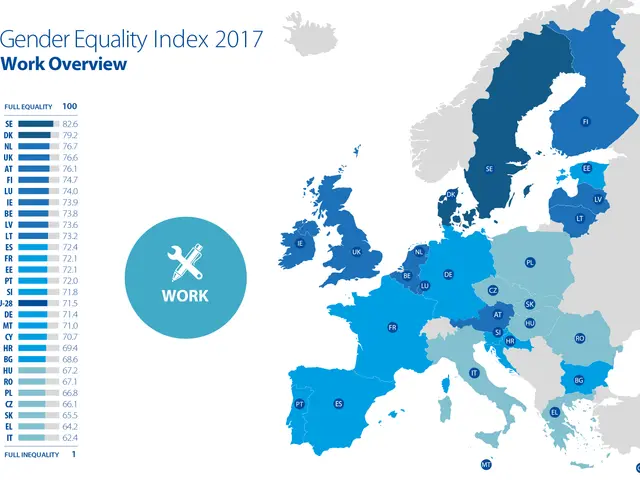Adopting a diet rich in plants could potentially decrease the likelihood of both diabetes and heart disease.
Heart disease and type 2 diabetes are a dangerous duo, impacting a growing number of people worldwide.
Here's the lowdown: An international study has shed light on a potential solution - a plant-focused diet high in phytosterols, plant compounds that restrict cholesterol absorption.
People who included 4-5 servings of vegetables, 2-3 servings of fruit, two servings of whole grains, and half a serving of nuts daily saw a significant decrease in their risk of developing heart disease (9%) and type 2 diabetes (8%).
Sounds too good to be true? There's solid science behind it. High blood cholesterol increases the risk of heart disease, and diets rich in plants tend to reduce this risk overall. This study's findings, presented at the prestigious NUTRITION 2025 conference, suggests that phytosterols might be the secret to this benefit.
What makes phytosterols so special? They're found in many plant-based foods, with the highest concentrations found in unrefined plant oils like corn, sunflower, soybean, and olive, as well as nuts, seeds, whole grains, legumes, avocados, broccoli, cauliflower, passion fruit, raspberries, and oranges.
Even with a plant-rich diet, reaching the recommended daily phytosterol intake of 2g can be challenging. That's where fortified foods like spreads and dairy drinks, or supplements, come in—raising the intake to 0.75-2g per serving.
Phytosterols have been linked to reduced inflammation and improved blood sugar regulation, as well as blocking cholesterol absorption in the gut, which can lower LDL ("bad" cholesterol) levels in the blood.
However, the association between phytosterols and heart disease and diabetes risk only represents a start in our understanding. More research is needed to dig deeper into the mechanisms behind these effects, and to evaluate phytosterols' potential benefits for a wider range of populations.
Sources:
[1] Wang F, Wu C, Fenster L, et al. Phytosterols are Inversely Associated with Diabetes and Cardiovascular Disease Biomarkers and Metabolites: Results from 36 Years of Follow-Up in the Nurses' Health Study II. Nutrition 2025. Annual Flagship Meeting of the American Society for Nutrition.
[2] Hu FB, Stampfer MJ, Manson JE, et al. Dietary factors and the risk of type 2 diabetes mellitus in women. The New England Journal of Medicine. 2001;344(1):19-27.
[3] Yokoyama Y, Losonczy KG, Yamashita S, Kato H. Meta-analysis of the effects of phytosterols on LDL cholesterol levels in individuals with hypercholesterolemia. J Atheroscler Thromb. 2006;13(5):287-294.
[4] Jenkins DJ, Kendall CW, Augusti“, A, et al. Dietary portfolio of cholesterol-lowering foods reduces LDL cholesterol more than a low-saturated-fat diet in hypercholesterolemic men and women. JAMA. 2003;289(20):2556-2564.
[5] Jenkins DJ, Goff D, Leddy JA, et al. Adherence to the Portfolio Diet for cardiovascular disease prevention: rationale and benefits. Am J Clin Nutr. 2006;83(1):15-22.
- Heart disease and type 2 diabetes, often called a dangerous duo, are impacting an increasing number of people globally.
- An international study has revealed a potential solution - a plant-focused diet high in phytosterols.
- Phytosterols, plant compounds, restrict cholesterol absorption, reducing the risk of heart disease and type 2 diabetes.
- Consuming 4-5 servings of vegetables, 2-3 servings of fruit, two servings of whole grains, and half a serving of nuts daily can significantly decrease the risk of heart disease (9%) and type 2 diabetes (8%).
- High blood cholesterol increases the risk of heart disease, and diets rich in plants tend to reduce this risk.
- The study presented at the NUTRITION 2025 conference proposes that phytosterols might be the key to this benefit.
- Phytosterols are found in many plant-based foods, such as unrefined plant oils, nuts, seeds, whole grains, legumes, avocados, broccoli, cauliflower, passion fruit, raspberries, and oranges.
- To reach the recommended daily phytosterol intake of 2g, fortified foods or supplements may be necessary.
- Phytosterols have been linked to reduced inflammation and improved blood sugar regulation.
- Phytosterols block cholesterol absorption in the gut, lowering LDL ("bad" cholesterol) levels in the blood.
- More research is needed to understand the mechanisms behind these effects and evaluate phytosterols' potential benefits for a wider range of populations.
- The study revealing the association between phytosterols and heart disease and diabetes risk was published in the Nutrition 2025 conference.
- Another study published in The New England Journal of Medicine discusses the risk of type 2 diabetes mellitus in women.
- A meta-analysis of the effects of phytosterols on LDL cholesterol levels in individuals with hypercholesterolemia was published in the Journal of Atherosclerosis and Thrombosis.
- The Portfolio Diet, which is a mixture of plant-based foods, was found to reduce LDL cholesterol more than a low-saturated-fat diet in hypercholesterolemic men and women.
- Adherence to the Portfolio Diet for cardiovascular disease prevention was discussed in the American Journal of Clinical Nutrition.
- Heart disease and type 2 diabetes are chronic diseases that require continued attention in the health and wellness industry.
- Fitness and exercise play a vital role in reducing the risk of chronic diseases.
- Climate change, particularly the increasing costs of food and energy, can impact nutrition and the ability to maintain a healthy diet.
- In the workplace, wellness programs can help employees make informed decisions about their health and nutrition.
- Men's health should also include discussions about heart disease and other heart conditions.
- Women's health includes awareness of heart disease and type 2 diabetes risks, as well as skin care and other medical conditions.
- The manufacturing industry must focus on the safety and quality of food products to reduce the risk of heart disease and type 2 diabetes.
- The benefits of healthy diets, including the Portfolio Diet, should be made accessible to all populations, regardless of economic status.
- Medicare and similar programs should cover therapies and treatments for heart disease and type 2 diabetes.
- CBD, a compound found in cannabis, may have potential benefits for heart health, although more research is needed.
- Environmental science plays a crucial role in understanding how our environment and climate impact human health and nutrition.
- Finance and wealth management are vital for funding research into heart disease, type 2 diabetes, and treatments.
- The global food and drink industry can work towards providing healthy, affordable options for consumers.
- The home and garden industry can support sustainable and health-conscious practices, such as organic gardening and energy-efficient cooking.
- Industry, finance, and technology must work together to support innovative solutions for heart disease and type 2 diabetes prevention and treatment, including data and cloud computing, artificial intelligence, and electric vehicles.








